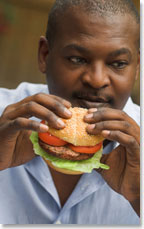 A recent study on depression treatment published in the Public Health Nutrition Journal found that eating fast foods and high-calories baked goods like croissants and muffins, on a frequent basis made participants around 50 percent more likely to develop symptoms of depression.
A recent study on depression treatment published in the Public Health Nutrition Journal found that eating fast foods and high-calories baked goods like croissants and muffins, on a frequent basis made participants around 50 percent more likely to develop symptoms of depression.
The researchers also found that the more fast food a person consumes, the greater the chance of depression. Additionally, the study suggested that individuals who eat the most fast food and commercial baked goods have the distinction of being the most likely to be single, less active, smoke, and have poor dietary habits. In general, the diet of these individuals lacked fruit, fish, vegetables, nuts, and olive oil.
Previous research into depression treatment has examined the role that diet plays in developing depressive disorders, suggesting that certain nutrients may play a role in preventing depression. The nutrients found to be most helpful include the B vitamins, omega-3 fatty acids, and olive oil. In the current study, the researchers noted that all of these were lacking in diets high in fast food and commercial baked goods.
The researchers found similar findings among those who ate reasonably high levels of baked goods. Additionally, even eating small quantities of commercial baked good was associated with a significantly higher risk of developing depression.
The study was a long-term examination of over 9,000 people who had not been previously diagnosed with depression. Over six months, about 500 of the participants developed depression or had begun to take antidepressants. The study confirmed previous research that found a 42 percent increased depression risk linked to fast food consumption.
In conclusion, the researchers noted that there were other factors at play. For example, poverty is strongly linked to both fast food intake and mental health problems. They also suggested that subjects who consumed higher amount of fast food were more likely to work greater than 45 hours per week. Additionally, the researchers noted that eating fast food and baked goods may also conversely represent a reflection of the type of depression found in depression treatment just as it may represent the cause.